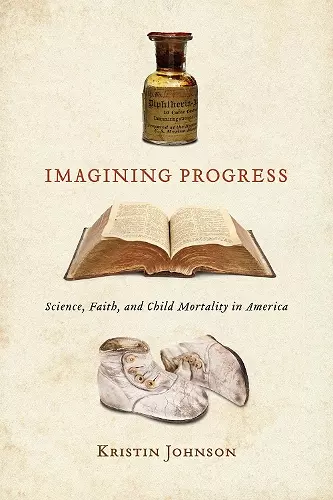Imagining Progress
Science, Faith, and Child Mortality in America
Format:Hardback
Publisher:The University of Alabama Press
Published:30th Jun '24
Should be back in stock very soon

Explores the intellectual history of Americans’ divergent assumptions about God, nature, and science
Offering fascinating examples from the works of diverse writers and thinkers such as Benjamin Franklin, Frederick Douglass, Mark Twain, W. E. B. Du Bois, Elizabeth Cady Stanton, and Harriet Shelton Dover, Kristin Johnson traces the history of Americans’ complicated faith in science and the various triumphs and tragedies that faith has inspired. Imagining Progress reveals many of the complex factors involved in the polarized state of contemporary American attitudes toward science, scientists, public health, medicine, and science policy.
Humankind has always wrestled with the existence of suffering, how to respond to suffering, whom to care for, and in what ways. For two centuries, many American ministers, physicians, and scientists believed that an omnipotent and omniscient God created the world such that people might relieve suffering through ingenuity and learning. Others responded to the new worldview introduced by the scientific revolution as a threat to the divine order. In Imagining Progress, Johnson traces the history of Americans’ evolving relationship with science and religion at “one of its most dramatic places”—the bedsides of dying children. It’s here, in the crucible of parental despair, that she illuminates diverging assumptions about God, nature, and history.
From Cotton Mather’s campaign for smallpox inoculation to battles over teaching evolution in the 1920s, Johnson adroitly weaves an interdisciplinary history of medicine, science, theology, and activism. She follows a wide cast of characters from across theological, scientific, and political spectrums. What emerges is a kaleidoscopic portrait of diverse, often contradictory hopes and anxieties inspired by new theories of nature and human existence. Johnson also discerns a problematic pattern of invoking science both to ameliorate the suffering of some children while ignoring the suffering of others.
“Visions of Progress is a well written, well researched and scholarly examination of suffering and the problem of evil in the world and how Americans sought to reconcile themselves to these problems through science and religion. . . This is a work of sincere and diligent scholarship worthy of a wide and attentive audience.” —Michael A. Flannery is Professor Emeritus of Libraries, University of Alabama at Birmingham. He is the author of numerous books: Nature’s Prophet: Alfred Russel Wallace and His Evolution from Natural Selection to Natural Theology; Civil War Pharmacy: A History; and most recently, America's Forgotten Poet-Philosopher: The Thought of John Elof Boodin in His Time and Ours
“The author’s approach to the material is original. . . clearly a new and interesting perspective on the relations of faith, medicine, and culture in American history. . . The broad range of time, choice of characters, and interdisciplinary approach makes this a potentially significant contribution to the field.” —Charles D. Kay, Ph.D, Professor Emeritus, Wofford College; former Chair of the Philosophy and Director of Medical Humanities; Past president of the SC Society for Philosophy
ISBN: 9780817322014
Dimensions: unknown
Weight: unknown
302 pages